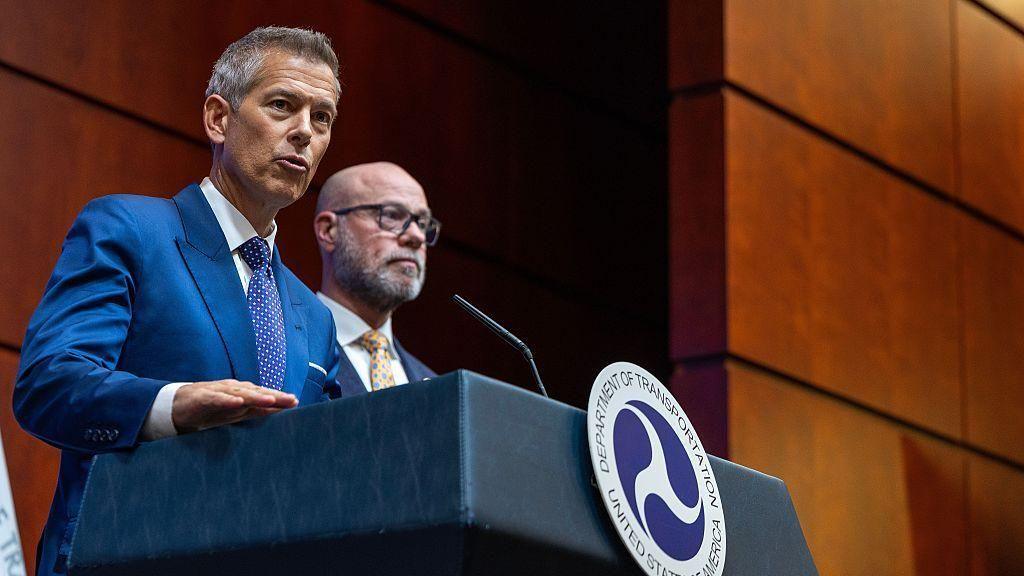U.S. Transportation Secretary Sean Duffy has issued a warning that air travel capacity at 40 major airports could be reduced by up to 10% in the coming days, should the government shutdown persist.
The decision, anticipated to impact domestic flights exclusively, stems from reports of fatigue among air traffic controllers, as disclosed by the head of the Federal Aviation Administration (FAA) during a joint briefing with Duffy.
Approximately 1.4 million federal employees, including air traffic controllers and park rangers, are currently working without pay or are on mandatory leave due to the U.S. Congress’s failure to approve a federal funding budget.
Significant airports in cities such as Atlanta, New York, and Washington D.C., are expected to experience service reductions.
Labor unions have reported that numerous employees are suffering from stress-related illnesses or are compelled to take on secondary employment.
On Wednesday, the ongoing impasse over federal government funding officially became the longest shutdown in U.S. history.
FAA Chief Bryan Bedford characterized the planned flight reductions as “unusual,” noting that “just as the shutdown is unusual, just as the fact that our controllers haven’t been paid for a month is unusual.”
Reuters news agency reports that the flight reductions will be implemented incrementally, starting with a 4% decrease in domestic flights on Friday, escalating to 5% on Saturday, and 6% on Sunday, before reaching the full 10% reduction next week.
The names of the affected airports, all high-traffic locations, are slated for official release on Thursday.
A list obtained by the BBC’s U.S. partner, CBS, from a source, identifies some of the nation’s busiest hubs.
These include Hartsfield-Jackson Atlanta International, New York John F. Kennedy International, Chicago O’Hare International, Ronald Reagan Washington National, and Los Angeles International airports. The BBC has reached out to the FAA and the Department of Transportation for confirmation of the official list.
The potential cancellations could impact between 3,500 and 4,000 flights daily. U.S. media outlets have also reported that international flights will remain unaffected.
Low-cost carrier Frontier Airlines has advised customers to consider purchasing tickets with other airlines as a contingency measure.
The FAA has stated that the service reductions are necessary to ensure the continued safety of U.S. airspace for passengers.
American Airlines, the second-largest carrier in North America, issued a statement indicating they are awaiting further details from the FAA to determine which flights will be cancelled, but “we expect the vast majority of our customers’ travel will be unaffected”.
Delta Air Lines informed the BBC that the majority of its flights are expected to operate as scheduled, and that customers can change, cancel, or refund their flights without incurring penalties.
Following the depletion of government funds on October 1, most federal employees were furloughed and assured they would receive back pay upon the government’s reopening. However, essential personnel, such as air traffic controllers, were required to continue working without compensation.
Almost immediately after the shutdown commenced, airports began experiencing disruptions. Some were forced to ground flights for several hours due to air traffic controllers calling in sick, while others relied on controllers from other airports.
Duffy previously warned this week that flight cancellations were a possibility, as half of the nation’s 30 major airports were facing staff shortages.
Nick Daniels, president of the labor union representing more than 20,000 aviation workers, provided a stark assessment of the situation on Wednesday.
“Air traffic controllers are texting, ‘I don’t even have enough money to put gas in my car to come to work,'” he told CNN. “We base what we do day in and day out on predictability,” he said. “Right now there is no predictability.”
In a recent opinion piece for MSNBC, another controller, a single father, shared that he was working for food delivery service DoorDash after his daily air traffic shift ended, and was “sleeping only two hours most nights”.
“Like many families, we didn’t plan for a shutdown,” he wrote. “Yet the bills don’t stop.”
Duffy previously stated that there was a risk associated with air traffic controllers taking on additional jobs during the shutdown, and had threatened to terminate controllers who failed to report to work.
Have you been affected by the issues raised in this story? Get in touch.
Pelosi made history as the first female Speaker and left an indelible mark on US politics.
Sean Dunn’s attorney acknowledged he threw the sandwich, but argued it was a “harmless gesture”.
Several of the busiest hubs will be affected from airports in Atlanta to New York and Los Angeles.
Abigail Zwerner sued a school administrator, claiming they had ignored a warning about the gun.
How much attention did you pay to what happened in the world over the past seven days?

